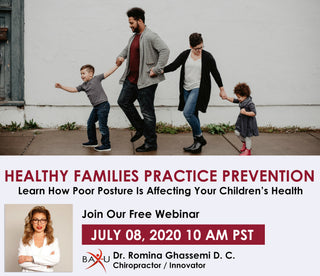The Problem
Parents always have the best intentions when it comes to their children. They will do anything and everything in their power to keep them safe, healthy, and happy. However, not all the time good intentions are enough. In the case of bad posture, most parents are not aware of its harmful effects and the possible serious diseases it can cause.
The major underlying reason for this is that the parents themselves do not practice proper posture in their day-to-day lives. This results in children mirroring the same behavior. Let’s get to the bottom of this.
The role of the spine
The spine is the body’s superhighway. It is where information travels to and from the brain. All the command that the brain sends passes through this highway. Likewise, all the information that our senses and our organs receive take this route to reach the brain.
Everyone knows the feeling of being stuck in horrible traffic. It’s annoying, it’s boring and most of all - it keeps people from getting to where they are supposed to be. This is pretty much the same thing that happens with the spine when it doesn’t get the care that it needs. Energy is depleted and bodily responses are delayed. When worse comes to worst, life-threatening diseases start to deteriorate the body - all because of poor posture.
When proper posture is not observed, the spine loses its natural curvature. It is forced to stay in an uncomfortable and damaging position whenever we do not sit or stand upright. In the long run, this results in headaches, strained muscles, and over fatigue.
What does poor posture do to a child / young person?
Aside from the physical effects of bad posture, it can also result in poor intellectual performance. As earlier discussed, the spine is the superhighway of the body where all information is transmitted. Poor posture could be one of the contributing reasons why some students do not do well in school. The same applies to adults - causing stress and poor performance at work.
The brain and body are being depleted, that's why young people and adults become more dependent on energy drinks and coffee.
Imagine a garden. It doesn’t matter how well-nurtured a garden is from the beginning if in the long run water supply starts decreasing and decreasing - it will start withering away.
The same happens with your child’s brain, their nervous system, and other vital organs if you do not work on correcting their posture at the onset.
When it comes to the body’s structure, motor skills, and the nervous system, here are the major diseases that bad posture can cause:
- Scoliosis
- Degenerative Arthritis
- Degenerative Disc Disease
- Parkinson’s disease
- Schrewman’s Disease
- Lack of Coordination
- Shorter Height
Stop and think! Observe your child. Assess whether they are starting to develop poor posture. Here are the most common indicators.
- Slouching
- Can’t hold up a proper seating position
- One shoulder is higher than the other
The Solution
Let’s go back to the basics. Parents should realize that everything starts at home. There is a saying that goes like, “Monkey see, monkey do”. This is true about most things that children see at home. What the parents model to their kids is what they will learn to do on their own as they grow up and age. The parents' behavior is the foundation by which they learn to do everything else in life.
Model good posture when doing everyday tasks
These simple tasks make up most of a parent’s day. Start by observing proper posture while doing the following. Let your kids notice the change.
- Using Your Phone
- Working on a computer or sitting in a desk
- Driving
- Walking and standing
Talk to your kids about the importance of good posture
Level with them by finding a conversation angle that they care about:
- Good posture helps you look smarter and more confident
- Posture has a lot to do with how you make your first impression
- It’s just way cooler to be able to carry yourself in an upright position than slouching all the time
Use a revolutionary innovation: preventive and corrective BAX-U brace
What BAX-U Braces can do for you:
- Adjusts shoulder position without compressing delicate arteries and nerves
- Corrects Poor posture & slouching
- No pinching or chauffing
- Incognito, Hidden Subtle and thin
- R&D with USA universities
Dr. Romina Ghassemi
Website: DRG@BAX-U.com
Phone Number: 8668662225
Tele-Consultation: https://calendly.com/drrominaghassemi/telemedicin-consultation

